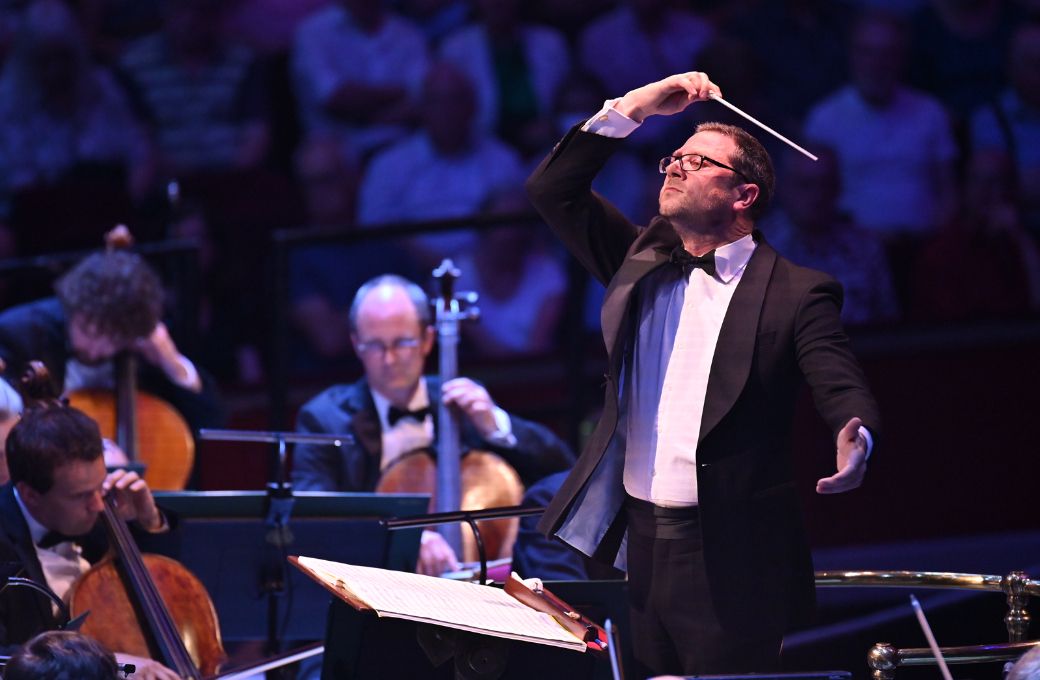Flag-waving is usually reserved for the Last Night of the Proms, a frivolous end of season party, but Prom 2 could easily have been billed as a celebration of British music. With his accomplished Sinfonia of London, John Wilson designed a rich, varied programme of music from this sceptred isle, but one without pomp, circumstance… nor a cow looking over a gate.
John Wilson conducts the Sinfonia of London
© BBC | Chris Christodoulou
–
–
The concert also served as a teaser to some of this season’s themes. In the 150th anniversary year of his birth, Ralph Vaughan Williams is a featured composer, although the lack of a symphony cycle is both surprising and disappointing, and Arnold Bax’s Tintagela ruined Cornish castle overlooking the Atlantic, pointed the way to a number of seascapes this summer.
On a very warm evening, Wilson began his musical tour in the cooling cloisters of Gloucester Cathedral, where Vaughan Williams’ Fantasia on a Theme of Thomas Tallis was premiered at the Three Choirs Festival in 1910. The work has a special connection for this ensemble, which Wilson reconvened in 2018. The Sinfonia of London was essentially a pick-up band, founded in 1955 for studio recordings. Its most famous LP was English String Music, conducted by Sir John Barbirolli, which featured the Tallis Fantasia.
Wilson wasn’t quite as expansive as Barbiroll, but he certainly took his time in the hushed serenity of the opening and the very long diminuendo – from ff to pppp – on the heavenly final chord. In between, he tended to push the music along swiftly where it wanted a little more breathing space and nobility. Nine players were seated at the very back of the platform, allowing RVW’s spatial effects of solo quartet, string orchestra and “ghost” ensemble to register well.
Adam Walker, John Wilson and the Sinfonia of London
© BBC | Chris Christodoulou
–
–
Adam Walker was the soloist in Huw Watkins’ Flute Concerto, written for him in 2013. It’s a really attractive piece, quite densely scored in the orchestral tuttis, with a beautiful Andante central movement which allowed Walker to shape lyric phrases over muted strings. His bright, bold sound shone in the animated finale, though even here there were beautiful, languid episodes.
Tintagel was given a terrific reading, its waves surging and crashing powerfully, the castle towering majestically in the brass. At just under 13 minutes, it was the fastest account I’ve heard, the Sinfonia of London players – many drawn from London’s finest orchestras, especially the LSO – on thrilling form.
From Cornwall to Oldham’s finest, William Walton, although his Match was more influenced by Italian rhythms than anything from his home town. Walton composed the work in Ischia, the island off Naples where he lived from middle age. It is a fiendishly taxing work, but Wilson and his orchestra made it seem easy, from the ebullient Toccata to the busy Giga Burlesca. Andriy Viytovych, principal viola at the Royal Opera House, and Tom Blomfield, the Philharmonia’s oboe, shone in the slinky Pastoral Siciliana. Both the Match and Tintagel deserve many more concert outings than they currently receive.
John Wilson conducts the Sinfonia of London
© BBC | Chris Christodoulou
–
–
Wilson closed the evening in more familiar musical territory with a visit to the Malvern Hills, background to Elgar’s Enigma Variations. Each variation on his “original theme” is composed in the style of one his friends, affectionate caricatures such as the winds imitating Dora Penney’s stutter or the brass depicting the bluster of Arthur Troyte Griffith. The work is a quite brilliant orchestral showcase and Wilson’s players painted vivid pictures. But there was nostalgia too in the deeply moving Nimrod (August Jaeger, Elgar’s publisher) and the clarinet’s wistful echoes of Mendelssohn’s Calm Sea and Prosperous Voyage in the Romance ***. Something in my eye?
****1
–


